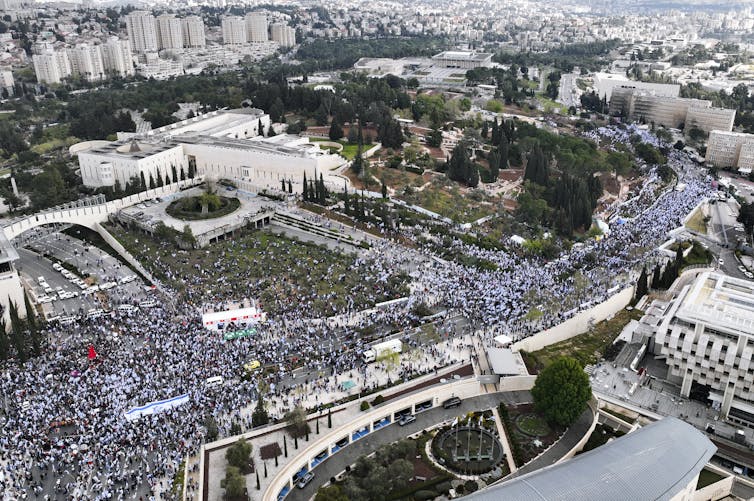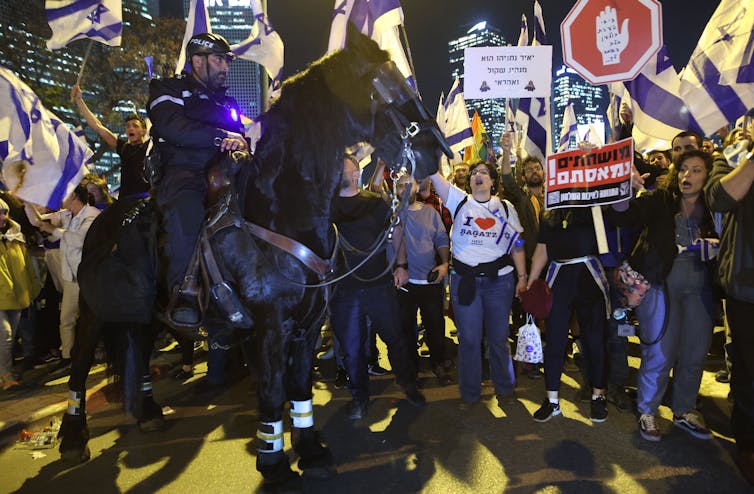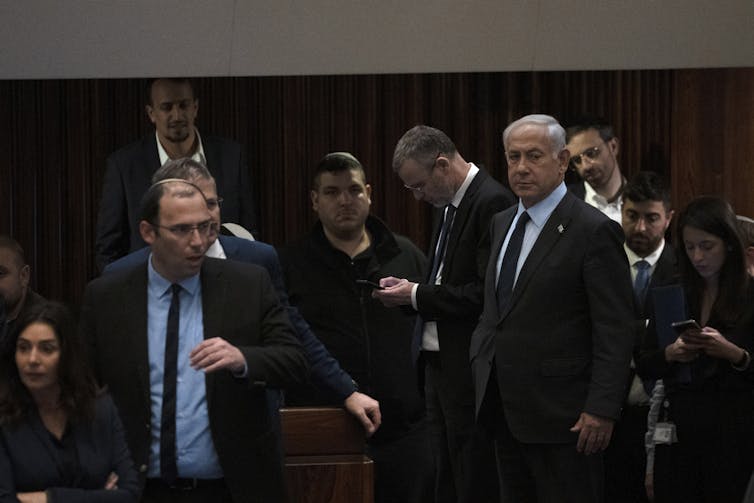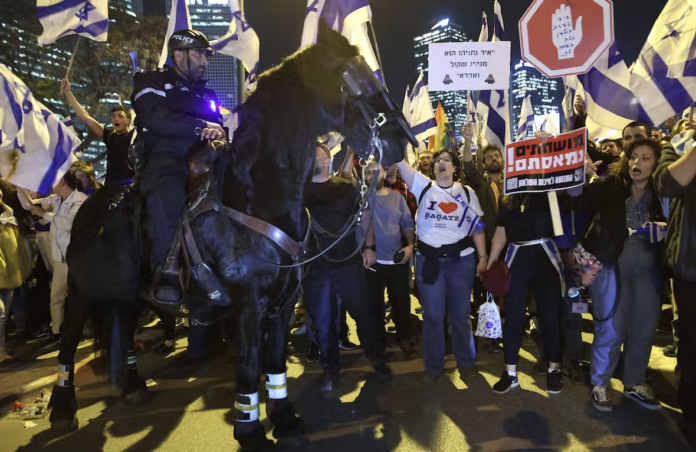What’s at stake as protests rock Israel: 3 essential reads on democracy, security and human rights

By Naomi Schalit, The Conversation
Israeli Prime Minister Benjamin Netanyahu has, after 12 weeks of growing protest against his proposed judicial reforms, said he will order a temporary halt to the changes that aimed to rein in the power of Israel’s judiciary and grant virtually unaccountable power to politicians.
Netanyahu’s announcement came after massive protests had spread throughout the country, turbocharged by his firing the day before of Israel’s defense minister, who had called on the government to postpone the judicial reform.
City services and universities were shut down. The Histadrut, the country’s largest and most powerful labor organization, went on strike. Doctors walked out; Israel’s consul general in New York resigned; planes were grounded at the national airport. And tens of thousands of people demonstrated outside of the Knesset, the country’s parliament, as members of the country’s [far-right groups] called for violence – using “gasoline, explosives, tractors, guns, knives” as a member of one group put it – against the protesters.
Isaac Herzog, Israel’s president – a largely ceremonial post – had earlier in the month unveiled a proposed compromise on judicial reform that aimed to protect Israel’s democratic character. At the time, Herzog warned: “Israel is in the throes of a profound crisis. Anyone who thinks that a real civil war, of human life, is a line that we will not reach has no idea. The abyss is within touching distance.”
The Conversation has followed the growing crisis in Israel since the beginning of 2023. Here are three stories that will help you understand what’s at stake.

1. ‘A major threat to democracy’
Political scientist Boaz Atzili at American University wrote that “democracy is not just about holding elections. It is a set of institutions, ideas and practices that allow citizens a continuous, decisive voice in shaping their government and its policies.” Netanyahu’s far-right-wing government, sworn in on Dec. 29, 2022, “presents a major threat to Israeli democracy, and it does so on multiple fronts,” he wrote.
Atzili described the four ways the new government put Israeli democracy at risk, from “hostility to freedom of speech and dissent” to plans to “allow discrimination against the LGBTQ community and women” to “West Bank annexation and apartheid” and “erasing the separation of powers.”
The courts in Israel, wrote Atzili, “are the only institution that can check the power of the ruling parties.” The judicial reform would erase that separation of power and, he wrote, “as in Turkey, Hungary or even Russia, Israel could become a democracy in form only, devoid of all the ideas and institutions that underpin a government that is actually of the people and by the people.”
2. ‘A very dangerous period’
Scholar Dov Waxman, an Israel expert at UCLA, said that he initially thought the warnings of an impending civil war or strife “were exaggerated and unnecessarily alarmist.”
But by mid-February, as the protests grew from tens of thousands to hundreds of thousands participating, Waxman changed his mind. “I think now those warnings are well founded. Israel is really entering a very dangerous period.”
The protests, Waxman wrote, “are driven by concerns over this judicial overhaul, but I think they speak to a broader anxiety, a fear among many Israelis about the future of democracy in Israel and the future of the country.”
But while Israelis are taking to the streets to defend their democracy, they have not included Palestinians in their protests.
“I can certainly understand why many Palestinians would be feeling that all of this sudden anxiety and concern for Israeli democracy ignores the fact that almost 50% of the population that Israel effectively rules over lacks equal rights and lacks the ability to vote in Israeli elections,” he wrote. “I think the fact that most Israelis don’t seem to connect these two issues suggests that they only see democracy as this internal domestic issue without any relevance to the Palestinian question.”
The crisis may also harm Israel’s interests outside of the state. “If the perception takes hold that Israel is no longer a democracy or not a liberal democracy,” wrote Waxman, “that could further weaken support for Israel in Congress and in the Democratic Party. It might even make it harder for them to continue to approve U.S. aid for Israel.”

3. A political crisis could become a security crisis
American University scholar Dan Arbell, who served in the Israel Defense Forces and as a member of the country’s foreign service, took note of an unprecedented aspect of the demonstrations: “It’s not simply the persistence and size of the protest that is evidence of the crisis,” he wrote. “It’s who is protesting.”
Arbell wrote that while the protests over the past three months have brought together people from a range of professions and interests, among the protesters is “a group of individuals rarely seen at anti-government protests over the country’s almost 75-year history: Israel Defense Forces reservists.” Those reservists, he wrote, “announced they will not volunteer for reserve duty service if the legislation passes in the Knesset, Israel’s parliament.”
That’s a sign that “the crisis’s implications extend far beyond the domestic political arena.” That means the crisis doesn’t just have meaning for the civic realm. “Besides threatening to undermine the economy and deepen societal divides,” wrote Arbell, “it threatens to erode Israeli national security and provoke a constitutional crisis that could ensnare the military as well.”![]()
Naomi Schalit, Democracy Editor, The Conversation
This article is republished from The Conversation under a Creative Commons license. Read the original article.



